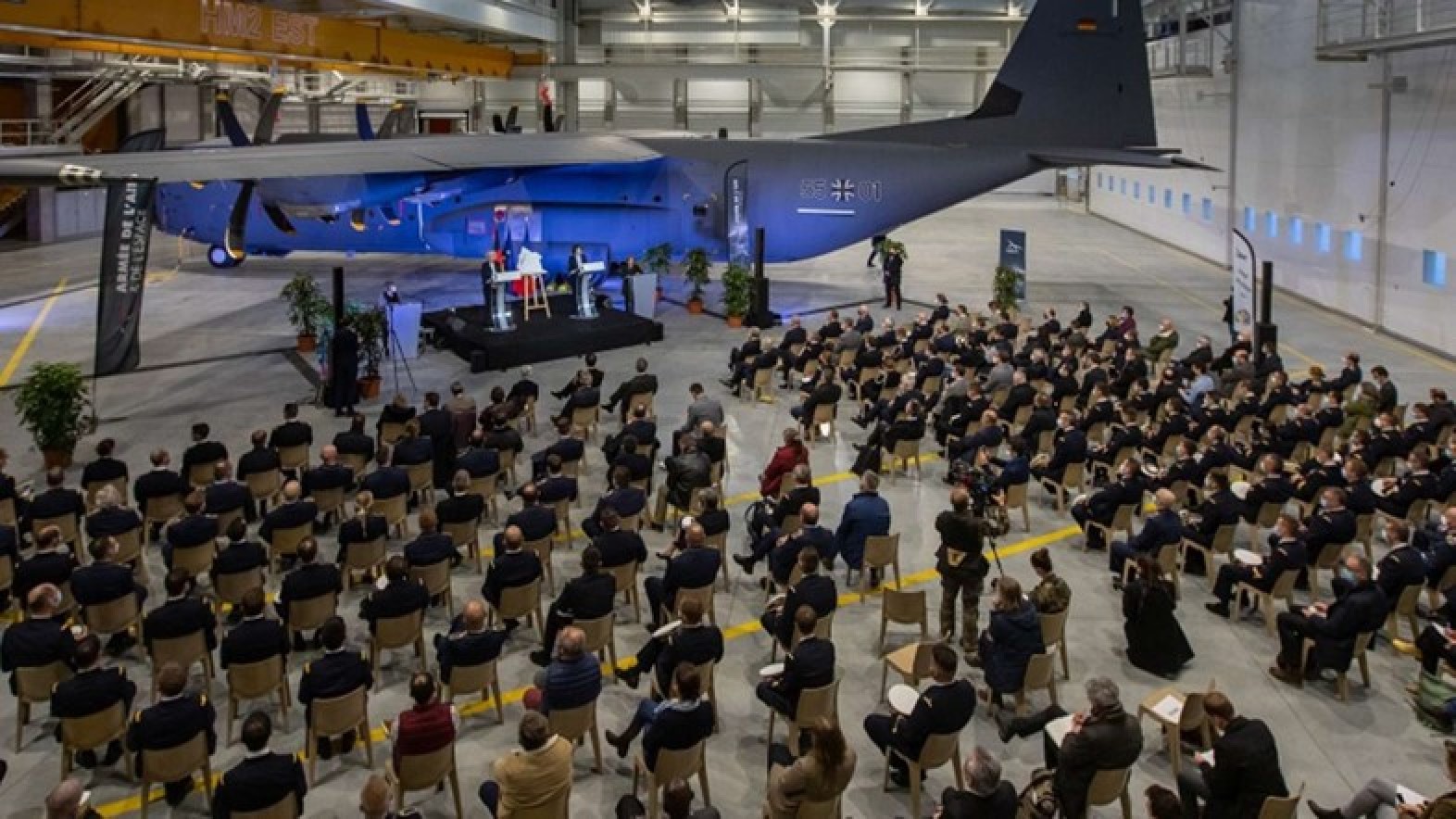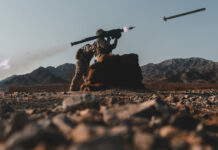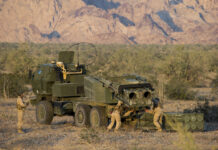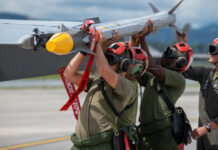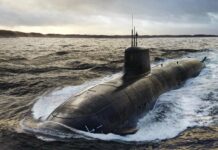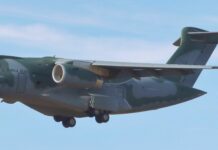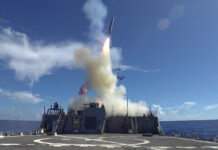When the ‘Rhein/Rhin’ Franco-German air transport squadron was officially inaugurated at Évreux, Normandy, on 9 March 2022, a new chapter of Franco-German military co-operation was opened. German and French military personnel commonly operate four French C-130J transport aircraft (two of which are KC-130J tanker variants) and three German C-130J-30s, while three German KC-130J tanker variants will complete the fleet by 2024.

Germany’s eventual fleet of six C-130Js are gradually closing the capability gap in providing tactical air transport from airfields with limited infrastructure that arose in late 2021 when the last German Transall C-160 transport aircraft were decommissioned. Even at an early stage this small fleet implied that the Luftwaffe was looking for suitable options for co-operation in order to utilise the aircraft as effectively as possible and, in France, Germany found a supporting partner in a neighbouring country facing a similar challenge. From a French point of view the aim was to find a partner nation that operates the same type of transport aircraft and, by pooling its four C-130Js as well as all the infrastructure and services required to operate them, benefit from the consequent operational and economic synergies.
In line with the Aachen Treaty this co-operation received political attention in both countries from the very beginning. Accordingly, in 2017 the German and French governments agreed to co-operate on tactical air transport, paving the way for this new kind of highly integrated co-operation. In this context the starting point was each country’s national procurement of the aircraft through Foreign Military Sales (FMS) contracts with the US government.
In addition to the aircraft, a new common infrastructure as a home base for the ‘Rhein/Rhin’ squadron, funded by both partners, was required. The French infrastructure procedures were very advantageous, above all regarding the challenging timeline, and all construction works were finished on time for the inauguration. From 2024 the flight and technical personnel will also have a common training centre, also funded in equal part by both countries and procured by France, that will include a flight simulator.
The guiding principle of this operational co-operation is largely common training and operations, based on joint planning, whenever possible without any distinction between national markings. National operations, of course, are integrated into mission planning and remain an exclusive responsibility. Pooling both partners’ aircraft and making reciprocal access options more flexible increases the availability of the squadron’s assets. While France assumes substantial responsibility for logistic support using its structures and procedures, the costs incurred are divided between the two countries in accordance with agreed criteria.
A unique and complex regulatory framework has been created for the organisation, implementation and support of this common operation. Various technical arrangements derived from two intergovernmental agreements provide the basis for common management at the appropriate levels. The entire co-operation largely relies on French procedures, which are commonly managed by a co-chaired governance organisation called the Common Commission. This is of particular importance for the German partner to have a voice and exert influence.

In a further development of the co-operation, it soon became clear that both the wide variety of topics and the immediate and routinely time-critical co-ordination requirements necessitate distinctions within the Common Commission that would not be provided by a conventional committee structure – essentially consisting of an executive and a steering committee. For that reason, the Operations Committee was established as a command body close to the squadron level by both countries’ air forces in order to supplement the C-130J Joint Executive Board and Joint Steering Committee. In addition, the Supportive Committees were formed as specialised committees for logistic support, infrastructure matters, the training centre, accreditation of IT systems and certification issues.
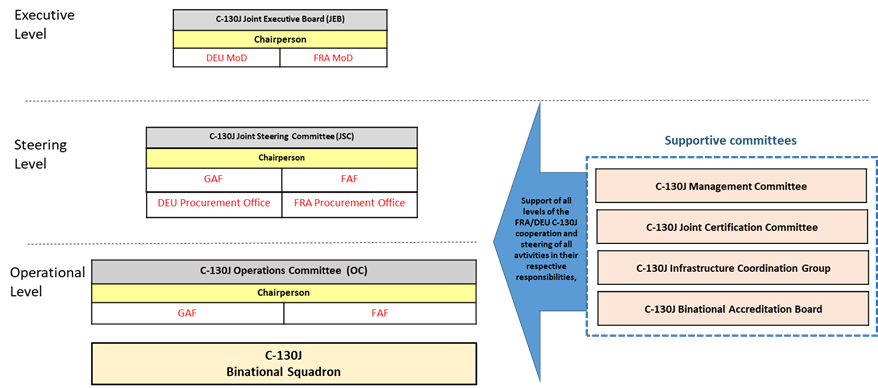
The relatively short period between the first intergovernmental agreement and the inauguration of the binational air transport squadron often required pragmatic, creative and parallel approaches from everyone involved. The existing French procedures and France’s experience as a longstanding C-130 operator were an especially favourable factor in this regard. At the same time the US government as the C-130J provider was willing to take into account the particularities of French-German co-operation within its FMS procedure, which is usually only bilateral. For example, the spare parts quantities and industrial support for the C-130Js were calculated based on all 10 aircraft involved in the joint squadron, with their procurement carried out through a separate French FMS contract. Only in this way does the extensive provision of spare parts in the French logistic system become possible.
The approach taken produces a significantly reduced footprint in the areas of equipment and in-service support, as well as operator responsibilities, for Germany. As a result, the tasks that inevitably remain under German responsibility are performed by a relatively small project branch at the Federal Office of Bundeswehr Equipment, Information Technology and In-Service Support as well as a small weapon system management team at the Luftwaffe’s Air Forces Command. It is also important to note that, for the first time, responsibility for maintaining the airworthiness of German aircraft on the basis of European Military Airworthiness Requirements (EMAR) has been given to a French Continuing Airworthiness Management Organisation (CAMO) in which a small number of German personnel are embedded.
The advantage of relying on the established French structures is doing without the external structures customary in multinational co-operation, such as agencies. This leads to a significant reduction in administrative costs, especially for Germany. In this context, fundamental acceptance of the French approach and broad confidence in the effectiveness and transparency of French administrative action are essential requirements.
Meanwhile, members of the binational air transport squadron have achieved a considerable number of flight hours. The team is now concentrating on obtaining the required operational capabilities.
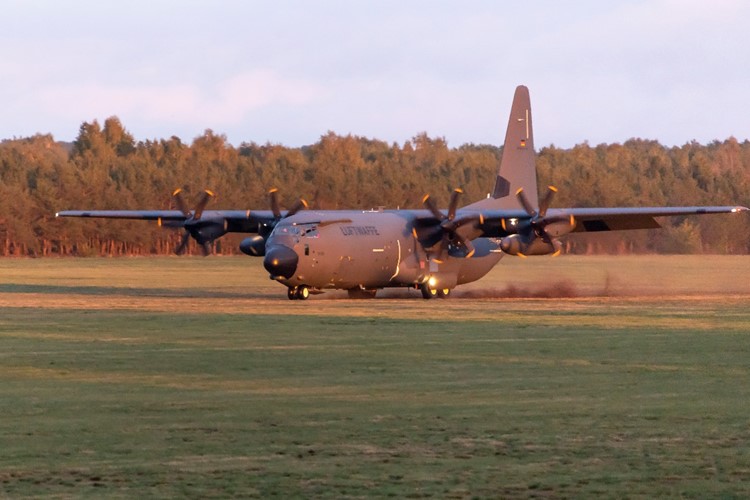
Nevertheless, this kind of complex operational co-operation, which has been developed over a relatively short period of time, certainly presents a few challenges. Sometimes they occur unexpectedly and are handled by working together closely at the appropriate levels. The close co-operation and pragmatism practised up to this point and the resulting mutual trust offer a solid foundation for these efforts.
The experience gained so far shows that the bilateral approach with a supporting partner has great potential if both parties are willing to leave their familiar national paths behind and move forward boldly and co-operatively in the interest of finding synergy. Furthermore, each country purchasing the C-130Js nationally has proven advantageous because it has shifted the focus of the squadron to its operational aspects.
Other countries have been watching this new Franco-German initiative closely and assessing how it can be applied to comparable projects. In this regard they are particularly interested in the need to largely prioritise the co-operative approach over national aspects in the interest of a high level of integration and of drawing on synergy effects in the operation of small aircraft fleets.
German MoD


